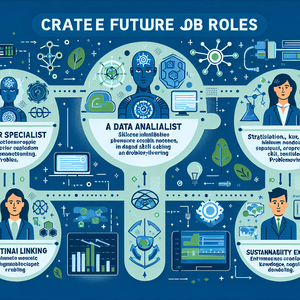Exploring the Future of Biotech Jobs: How Novartis is Shaping the Industry

As biotechnology continues to evolve, so do the roles within it. Several key areas are gaining momentum, particularly in gene therapy and personalized medicine. The ability to modify genes to treat or prevent diseases is becoming a reality, necessitating a workforce skilled in genetics, molecular biology, and bioinformatics. Positions such as genetic counselors, gene therapy researchers, and bioinformatics analysts are not only growing but are becoming critical in translating research into viable treatments. For instance, genetic counselors are increasingly needed to help patients understand genetic testing results and the implications for their health. Gene therapy researchers are developing innovative solutions to combat genetic disorders, while bioinformatics analysts play a pivotal role in managing and interpreting the vast amounts of data generated in genomic studies. Digital health is another rapidly expanding sector within biotech. With the rise of telemedicine and health applications, professionals who can effectively bridge the gap between healthcare and technology are in high demand. Emerging roles such as health informatics specialists and data analysts are becoming essential as they help interpret vast amounts of health data to improve patient outcomes and operational efficiency. The integration of technology into health management is reshaping traditional roles and creating new opportunities for innovation.
Skills in High Demand
As the landscape of biotechnology careers shifts, the skills necessary to thrive in these roles are also evolving. According to industry leaders, a combination of technical expertise and soft skills will be crucial. Proficiency in data analysis and programming is essential, particularly for those working in digital health and bioinformatics. Familiarity with artificial intelligence (AI) and machine learning is increasingly valuable as these technologies come to influence drug development and patient care. For example, professionals in bioinformatics often utilize AI algorithms to analyze complex biological data, making programming skills indispensable. Moreover, as the field becomes more data-driven, the ability to interpret and communicate findings effectively will be a significant asset. Soft skills, such as collaboration, communication, and adaptability, are equally important in a field that relies heavily on cross-disciplinary teamwork. The ability to convey complex scientific concepts in a way that is accessible to non-specialists will be vital in roles that interface with healthcare providers and patients. As the industry becomes more patient-focused, professionals must also possess strong interpersonal skills to build trust and effectively communicate the benefits of new therapies.
Insights from Industry Leaders
To gain a deeper understanding of these trends, we reached out to several industry leaders at Novartis. Dr. Emily Chen, a senior researcher in gene therapy, emphasized the importance of continuous learning. "The field is changing so rapidly that professionals need to be committed to lifelong education," she stated. "Staying updated on the latest technologies and methodologies is crucial for anyone looking to succeed in biotech." Dr. Chen's insights reflect the necessity of ongoing professional development in an industry characterized by rapid technological advancements. The commitment to learning is essential not only for individual growth but also for contributing meaningfully to the field. Additionally, Michael Thompson, the head of digital health initiatives at Novartis, highlighted the significance of understanding patient needs. "Innovation should always be patient-centered. Those entering the field must have a strong awareness of how their work impacts real lives," he noted. This perspective aligns with a more holistic approach to biotechnology careers, where empathy and user experience play a significant role in development. As biotech continues to grow, professionals will be tasked with ensuring that technological advancements translate into improved patient care and health outcomes.
The future of biotechnology jobs is bright and filled with opportunities, particularly at innovative companies like Novartis. As gene therapy, digital health, and personalized medicine continue to evolve, so will the roles and skills required to meet the challenges of this dynamic industry. By embracing continuous learning and fostering a patient-centered approach, aspiring professionals can position themselves for success in a field that promises not only career advancement but also the chance to make a meaningful impact on global health. In conclusion, the biotechnology sector is not merely a collection of jobs; it is a vibrant ecosystem poised for growth and innovation. As Novartis and other industry leaders continue to push the boundaries of science and technology, the opportunities for aspiring biotech professionals are limitless. The future is indeed promising for those ready to take the leap into the ever-evolving world of biotechnology.
Genetic Counselor
Hospitals, genetic testing laboratories, and research institutions
Core Responsibilities
Provide patients and families with information about genetic testing and inherited conditions.
Interpret genetic test results and discuss implications for health and family planning.
Collaborate with healthcare providers to create personalized health management plans based on genetic data.
Required Skills
Strong background in genetics and counseling techniques.
Excellent communication skills to convey complex information clearly.
Empathy and interpersonal skills to support patients emotionally.
Gene Therapy Research Scientist
Biotech companies, universities, and research institutions
Core Responsibilities
Design and conduct experiments to develop gene therapies for genetic disorders.
Analyze research data to evaluate the efficacy and safety of therapeutic candidates.
Collaborate with cross-functional teams to transition research from the lab to clinical trials.
Required Skills
Expertise in molecular biology, genetics, and biochemistry.
Proficiency in laboratory techniques such as CRISPR and vector development.
Strong analytical skills and experience with data interpretation using bioinformatics tools.
Bioinformatics Analyst
Pharmaceutical companies, research institutions, and healthcare organizations
Core Responsibilities
Analyze and interpret large datasets generated from genomic studies to derive meaningful insights.
Develop and apply algorithms to enhance data analysis processes.
Collaborate with biologists and researchers to integrate data findings into ongoing projects.
Required Skills
Proficient in programming languages (e.g., Python, R) and bioinformatics software.
Strong statistical analysis skills and familiarity with machine learning techniques.
Ability to communicate complex data findings to non-technical stakeholders.
Health Informatics Specialist
Hospitals, health technology firms, and healthcare consulting companies
Core Responsibilities
Manage and analyze patient data to improve healthcare delivery and outcomes.
Design and implement health information systems that support telemedicine and digital health initiatives.
Work with clinical teams to ensure data integrity and compliance with health regulations.
Required Skills
Knowledge of health informatics systems and electronic health records (EHR).
Strong analytical skills with the ability to leverage data for clinical decision-making.
Familiarity with programming and database management (SQL, Python).
Digital Health Data Analyst
Health tech startups, hospitals, and pharmaceutical companies focusing on digital solutions
Core Responsibilities
Analyze data from digital health applications and telemedicine platforms to assess user engagement and outcomes.
Collaborate with product teams to refine digital health tools based on data-driven insights.
Present findings to stakeholders to inform strategic decisions and improve patient care.
Required Skills
Strong background in data analysis and visualization (e.g., Tableau, Excel).
Experience with statistical analysis and understanding of health metrics.
Excellent communication skills to convey insights to technical and non-technical audiences.


